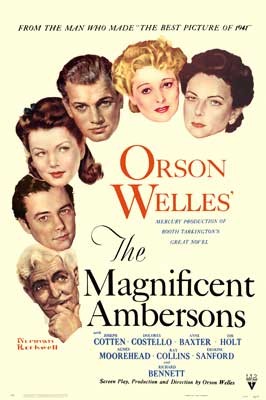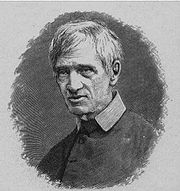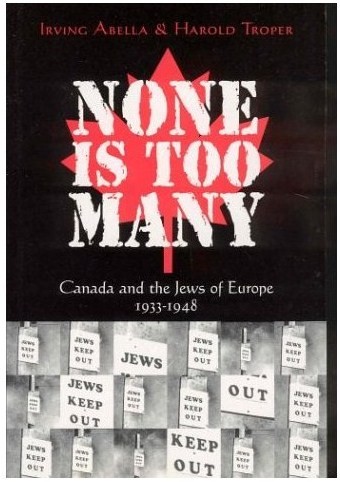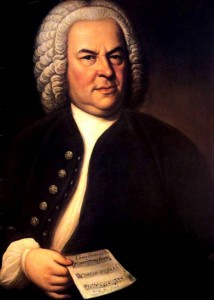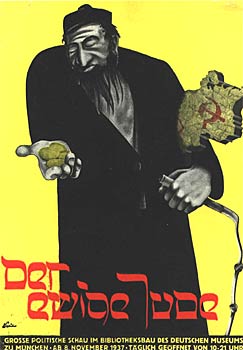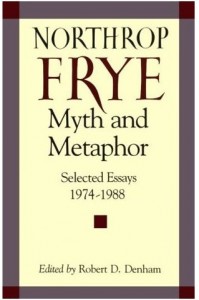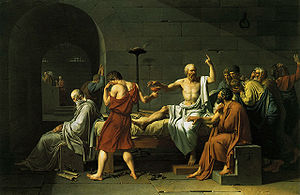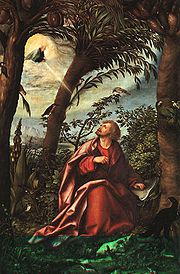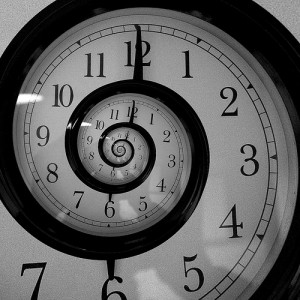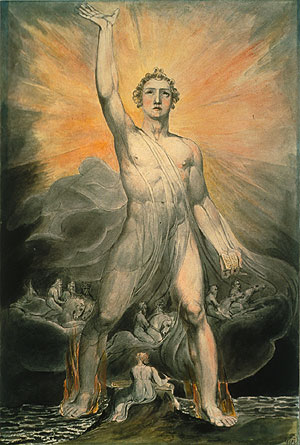
Blake's Angel of Revelation
Over the last couple of days the Comments section for a number of posts have lit up, especially for Adamson and Chrusch: “Both/And”. Michael Sinding’s comment below brings some interesting elements into play.
The question of logic in language, in literature, and in Frye’s ideas has at times bothered me also. First, we should remember that even though standards of logic and reference don’t apply directly to literature, they certainly do apply to Frye’s criticism, and I think that’s one thing Clayton is getting at. But how do you apply such standards to the use of metaphor and analogy in argument?
I don’t think we should rush to toss logic overboard just by appealing to centripetal attention and human concern, as opposed to centrifugal attention and reference. With metaphor and literature, do we leave behind the world of either/ or for the world of both/ and, where anything goes? But then what principles of structure and order are left? How can we explain why some metaphors are sensible and powerful, and others aren’t? Do they have their own kind of logic?
Let me suggest another way of approaching these things—one that I’ve been working with, and find persuasive. It’s closer to these topics than is formal logic.
Frye argues that language, concepts, logic, even mathematics, have metaphorical and mythical (narrative) structure. In fact, there’s been a big movement in linguistics in the past few decades, to treat metaphor in this way, as pervasive in language and conceptual structure. In “cognitive linguistics,” a key idea is that a metaphor is a mapping of structure from one concept to another. Metaphors carry language, imagery, and inferential structure from concept A (usually well-understood, often concrete) to concept B (usually less well-understood: abstract or subjective). That transfer of inference, or logical entailments, is essential: it means metaphor is genuinely cognitive—not simply ornamental or aesthetic. So people can and do study the metaphorical structure of linguistic concepts, logical concepts, and mathematical concepts.
For example, we can talk about our lives using expressions like “I’ve come a long way,” “I’m at a dead end,” “I’m moving on,” “I burned my bridges,” etc. This indicates an underlying mapping of Life as a Journey. Thinking with this metaphor highlights some aspects of life, and hides others. For an example from logic, categories are seen metaphorically as containers. Thing X can be “in” category A, or “out” of it. If B is a subcategory of A, then it is a smaller container inside container A. If thing X is in B, then it is necessarily also in A. So the logic of categories borrows the logic of containers.
There’s lot of information about CL out there, and it’s been used in literary studies a fair bit. A few references:
George Lakoff and Mark Johnson. Metaphors We Live By. 1980 (2nd ed., 2003). The book that started it all.
—. Philosophy in the Flesh. 1999. Applies their theory of metaphor to basic philosophical concepts, like time, mind, causation, being, etc., then to some major philosophical systems.
George Lakoff and Mark Turner. More Than Cool Reason. 1989. Develops the theory for poetic metaphor.
These are all crystal clear, highly readable, and intellectually sophisticated. I find them reminiscent of some of Frye’s ideas, though I don’t find any evidence of him being an influence on them (to go back to that influence stuff). They go into more detail than Frye does about the structure of concepts, and how they get mapped in metaphor, and how metaphors can combine, etc.
This idea, I think, also helps us be cautious about how far our language and concepts actually fit the world. Metaphors and analogies are very useful, but we should always ask just how they fit what they refer to, and how they may clash with it. Things in the world certainly don’t fit the above category logic in any simple way. So seeming contradictions may be only contradictions in terms (semantic, as Joe says), linguistic oppositions mistaken for logical ones. Frye is good at noticing and resolving these. For what it’s worth, I think interpenetration is in large part a way of perceiving or experiencing things. To what extent it’s reflected in the physical world I don’t know. But if Blake’s line ‘to see a world in a grain of sand’ expresses the idea, then the stress is on the seeing: interpenetration arises from attention. By the way, Bob Denham has a great essay in Rereading Frye about Frye’s ideas of interpenetration and where they came from.
Perhaps it should be emphasized that Frye does not in any way forsake logic. However, he does subordinate it. The big reveal in “The Tentative Conclusion” of Anatomy is that the “literary universe” he explores across four essays turns out to be the entire “verbal universe.” It’s not either/or when it comes to centripetal and centrifugal meaning, of course; it’s both/and. However, centripetal meaning is prior, and the increasingly centifugal dialectic of language in “Theory of Symbols” returns metaliterarily to its centripetal singularity as anagogic metaphor. That is not to say that all of the other applications of language have been abandoned or supplanted. They have been fulfilled. What ought to be the epiphanic recognition of primary concern (which Frye calls “intensified consciousness” in Words with Power) has passed through logic and is informed by it, although it can’t be limited or wholly defined by it. It’s this kind of thing that makes Frye a visionary: his ability to articulate the way in which literature is extra-rational; not to mention that “literary” language is the foundation of all language — something even literary scholars are often not very clear on.
